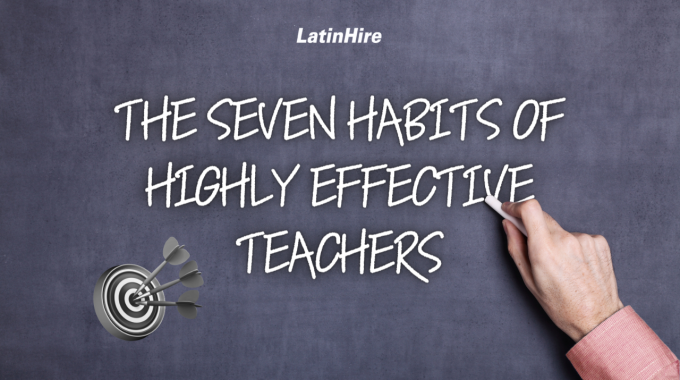As online teachers and tutors, we heavily rely on Zoom to teach and connect with…

The Seven Habits of Highly Effective Teachers
Teaching is not just about being in front of a class and imparting knowledge. It is both an art and a science, requiring a unique set of skills and qualities that go beyond the curriculum. Highly effective teachers not only teach, but also inspire and empower their students to reach their full potential.
In this article, we’ll explore the seven habits of exceptional educators and the factors that contribute to their success in the classroom.
Habit #1: Cultivate a Passion for Learning

One of the key habits of highly effective teachers is their ability to ignite a passion for learning in their students. These educators go beyond simply delivering information; they create an engaging and dynamic learning environment that sparks curiosity. Whether it’s through interactive activities, real-world examples, or thought-provoking discussions, effective teachers instill a love for learning that extends beyond the classroom.
Effective teachers also have a personal passion for learning themselves. A commitment to ongoing professional development not only keeps educators on top of the latest teaching methodologies but also serves as a source of inspiration for their students. When teachers model a genuine enthusiasm for acquiring new knowledge and skills, it can be a contagious atmosphere of growth within the classroom.
Habit #2: Building Strong Relationships
Establishing meaningful connections with students is crucial for effective teaching. Successful educators take the time to understand their students’ individual strengths, weaknesses, and learning styles. By fostering a supportive and inclusive classroom community, teachers create a safe space where students feel comfortable expressing themselves, taking risks, and actively participating in their education.
Effective teachers also build strong relationships with other educators and actively collaborate within their professional communities. Recognizing the collective strength of a supportive network, these teachers engage in ongoing dialogue with colleagues, sharing insights, resources, and strategies. This collaborative approach not only enhances the quality of teaching, but also provides a platform for discussing challenges, celebrating successes, and refining teaching practices.
Habit #3: Adaptability and Flexibility

Highly effective teachers understand that every class is unique, and every student learns differently. They possess the ability to adapt their teaching methods to accommodate diverse learning styles, needs, and backgrounds. Flexibility allows educators to tailor their approach, ensuring that each student receives the support necessary for academic and real-life success.
With the world evolving faster than the blink of an eye, being adaptable and flexible is more crucial than ever. Effective teachers recognize that the landscape of education is continually changing, with new technologies, methodologies, and societal dynamics shaping the learning environment. By embracing flexibility, teachers create an atmosphere where learning is reflective of the ever-changing world, preparing students not only academically but also for the challenges they may encounter in an evolving society.
Habit #4: Setting Clear Expectations
Establishing clear expectations is a fundamental habit of effective teachers. By clearly communicating classroom rules, academic standards, and behavioral expectations, educators create a structured environment that promotes focus and discipline. Consistent enforcement of these expectations helps students understand the importance of responsibility, accountability, and respect within the learning community.
Students will meet the lowest expectations that their teachers set. Therefore, effective teachers understand the critical importance of setting high standards and clear expectations from the outset. But establishing a framework that emphasizes academic excellence, personal responsibility, and respectable behavior, teachers create a foundation for a positive and focused learning environment.
Habit #5: Organizational Skills

Effective teachers not only possess a wealth of knowledge but also demonstrate exceptional organizational skills. A well-organized classroom is a cornerstone of successful teaching, creating an environment where both educators and students can thrive. From meticulously planned lesson structures to thoughtfully designed learning materials, organized teachers ensure that every aspect of the learning experience is purposeful and coherent.
Beyond the physical organization of the classroom, effective educators also organize their time effectively, juggling various responsibilities without compromising the quality of their teaching. Organizational skills enable teachers to create lesson plans that flow seamlessly, allocate time effectively, and provide timely feedback. Ultimately, the ability to maintain order and structure in the educational setting enhances the overall learning experience and sets the stage for academic success.
Habit #6: Encourage Critical Thinking
Instead of merely transmitting information, effective teachers encourage their students to think critically and analytically. They create an environment that fosters questioning, problem-solving, and independent thought. By guiding students to analyze information, form their own opinions, and articulate their ideas, teachers empower them with essential skills that extend beyond the academic setting.
Critical thinking is a vital skill in today’s society. In an age where misinformation is prevalent, effective teachers teach their students to discern credible sources, question biases, and make informed decisions. By incorporating critical thinking into their teaching methods, educators not only prepare students for academic success but also cultivate individuals who can navigate the complexities of the modern world with confidence.
Habit #7: Reflective Practice

The habit of reflective practice is a cornerstone of effective teaching. Successful educators regularly assess their teaching methods, evaluate student outcomes, and reflect on their own performance. By seeking feedback, analyzing successes and challenges, and adjusting their approach accordingly, teachers continuously improve their ability to meet the evolving needs of their students
Reflective practice extends beyond individual reflection as it often involves seeking feedback from peers, students, and mentors. By embracing this habit, teachers not only enhance their own professional development but also contribute to the collaborative culture of the educational community. In fostering a commitment to reflective practice, effective teachers demonstrate a willingness to adapt and learn, ensuring that each academic year becomes an opportunity for growth in the pursuit of excellence.
What other habits do you think highly effective teachers have? Share them with us in the comments below!



